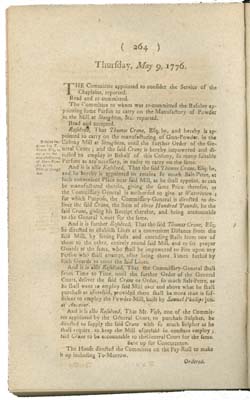"Thursday, May 9, 1776"
To order an image, navigate to the full
display and click "request this image"
on the blue toolbar.
-
Choose an alternate description of this item written for these projects:
- Main description
[ This description is from the project: Coming of the American Revolution ]
"Bring in a Resolve"
It is May of 1776, and the delegates to the Continental Congress are still strongly divided on the question of independence. The colonial assemblies of Maryland, Pennsylvania, and New York have only authorized their delegates to work for reconciliation with Great Britain, which looks increasingly impossible, but the delegates from Massachusetts hope that the Massachusetts General Court will lead the other legislatures by example. Among the other business of the day, the General Court introduces a motion to prod the Massachusetts citizens into action.
It is May of 1776, and the delegates to the Continental Congress are still strongly divided on the question of independence. The colonial assemblies of Maryland, Pennsylvania, and New York have only authorized their delegates to work for reconciliation with Great Britain, which looks increasingly impossible, but the delegates from Massachusetts hope that the Massachusetts General Court will lead the other legislatures by example. Among the other business of the day, the General Court introduces a motion to prod the Massachusetts citizens into action.
Questions to Consider
1. What other issues are being discussed in the Massachusetts General Court (also known as the House of Representatives) on 10 May?
2. Why might the General Court ask the towns to give instructions to the Congress?
Further Exploration
3. Did other colonial legislatures ask their town committees to also send instructions to Congress?
4. What other examples of popular pressure on Congress can you find?
5. Why is it so important that the Congress needs these votes from the towns and counties?
1. What other issues are being discussed in the Massachusetts General Court (also known as the House of Representatives) on 10 May?
2. Why might the General Court ask the towns to give instructions to the Congress?
Further Exploration
3. Did other colonial legislatures ask their town committees to also send instructions to Congress?
4. What other examples of popular pressure on Congress can you find?
5. Why is it so important that the Congress needs these votes from the towns and counties?

